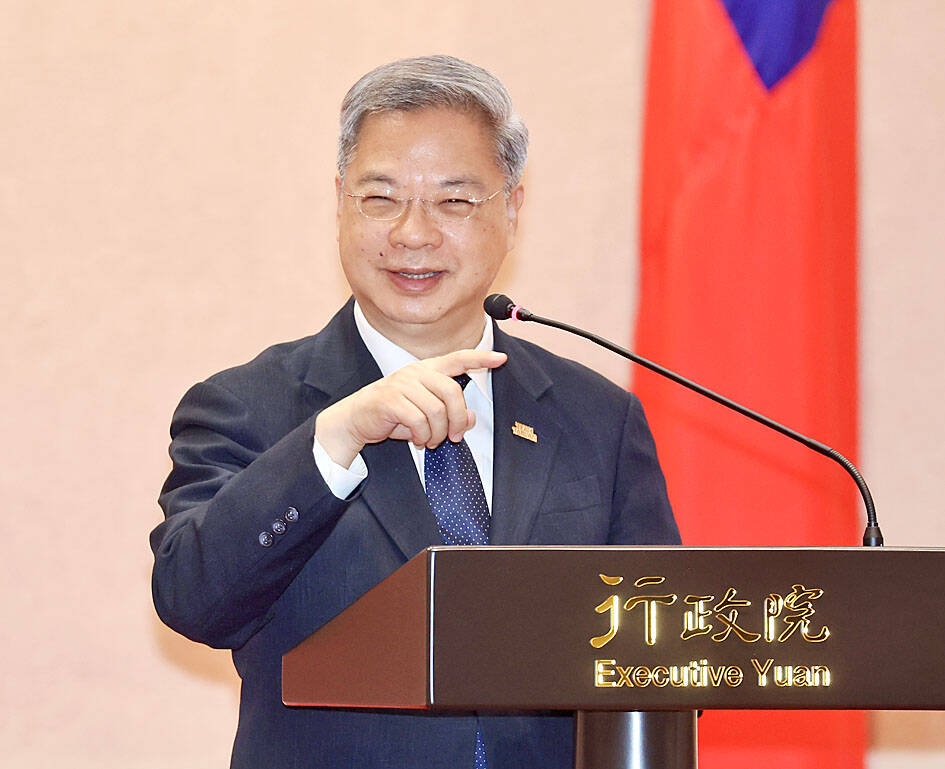New Minister of Economic Affairs Kung Ming-hsin (龔明鑫) yesterday said that as some industries face higher US tariffs than their foreign rivals, it leaves room for firms to tap non-US markets and adopt different strategies.
“I believe Taiwan will always have a path to follow in any situation,” Kung told reporters after his inauguration ceremony in Taipei, addressing the US’ announcement of a 20 percent tariff on Taiwanese goods last month.
“Tariffs are a pretty complicated matter,” he said. “If competitors seize the US market with lower tariffs, it means non-US markets open up very big opportunities.”

Photo: CNA
“It is not entirely the case that high tariffs mean there is no way forward,” Kung said. “It depends on the situation.”
Kung, formerly Executive Yuan secretary-general, replaced J.W. Kuo (郭智輝) as head of the ministry, after Kuo resigned last month citing health reasons.
Kung said he would “prioritize the economy” and take action on tariff response measures.
While an investigation under Section 232 of the US Trade Expansion Act is ongoing, the government would continue to monitor developments and consult with technology industries to devise countermeasures, he said.
The Executive Yuan’s Office of Trade Negotiations and Vice Premier Cheng Li-chiun (鄭麗君), who leads the delegation on US tariff talks, would remain in charge of the trade talks, but the ministry would play a supporting role on the front line and behind the scenes, Kung said.
Kung also thanked the legislature for passing amendments to the Special Act for Strengthening Economic, Social and National Security Resilience in Response to International Circumstances (因應國際情勢強化經濟社會及民生國安韌性特別條例).
As the act includes a NT$93 billion (US3.04 billion) special budget for industrial support to counter the impact of US tariffs, the Executive Yuan would soon submit a special budget, and the ministry would provide urgent assistance, he said.
The ministry would focus on bolstering infrastructure investment, supporting small and medium-sized enterprises, and traditional industries, improving water management, ensuring a stable power supply, and promoting the nation’s high-tech industry abroad, Kung said.
“We hope to make Taiwan a country where the economic sun never sets,” he said.
Kung yesterday also met with leaders from major industry associations — including the Chinese National Federation of Industries, the Chinese National Association of Industry and Commerce, the General Chamber of Commerce of the Republic of China, the National Association of Small and Medium Enterprises, and the Taiwan Electrical and Electronic Manufacturers’ Association — to discuss the economic situation.
Business leaders are concerned about exchange rate stability, tariff negotiations, carbon fees, labor supply and the minimum wage, Kung told reporters after the meeting.
The special budget already includes NT$5 billion to encourage purchases of domestically made equipment, and NT$7 billion to help firms explore new markets, he said, adding that the ministry would continue to monitor its implementation.
Additional reporting by CNA

On Tuesday, US President Donald Trump weighed in on a pressing national issue: The rebranding of a restaurant chain. Last week, Cracker Barrel, a Tennessee company whose nationwide locations lean heavily on a cozy, old-timey aesthetic — “rocking chairs on the porch, a warm fire in the hearth, peg games on the table” — announced it was updating its logo. Uncle Herschel, the man who once appeared next to the letters with a barrel, was gone. It sparked ire on the right, with Donald Trump Jr leading a charge against the rebranding: “WTF is wrong with Cracker Barrel?!” Later, Trump Sr weighed

HEADWINDS: Upfront investment is unavoidable in the merger, but cost savings would materialize over time, TS Financial Holding Co president Welch Lin said TS Financial Holding Co (台新新光金控) said it would take about two years before the benefits of its merger with Shin Kong Financial Holding Co (新光金控) become evident, as the group prioritizes the consolidation of its major subsidiaries. “The group’s priority is to complete the consolidation of different subsidiaries,” Welch Lin (林維俊), president of the nation’s fourth-largest financial conglomerate by assets, told reporters during its first earnings briefing since the merger took effect on July 24. The asset management units are scheduled to merge in November, followed by life insurance in January next year and securities operations in April, Lin said. Banking integration,

LOOPHOLES: The move is to end a break that was aiding foreign producers without any similar benefit for US manufacturers, the US Department of Commerce said US President Donald Trump’s administration would make it harder for Samsung Electronics Co and SK Hynix Inc to ship critical equipment to their chipmaking operations in China, dealing a potential blow to the companies’ production in the world’s largest semiconductor market. The US Department of Commerce in a notice published on Friday said that it was revoking waivers for Samsung and SK Hynix to use US technologies in their Chinese operations. The companies had been operating in China under regulations that allow them to import chipmaking equipment without applying for a new license each time. The move would revise what is known

Artificial intelligence (AI) chip designer Cambricon Technologies Corp (寒武紀科技) plunged almost 9 percent after warning investors about a doubling in its share price over just a month, a record gain that helped fuel a US$1 trillion Chinese market rally. Cambricon triggered the selloff with a Thursday filing in which it dispelled talk about nonexistent products in the pipeline, reminded investors it labors under US sanctions, and stressed the difficulties of ascending the technology ladder. The Shanghai-listed company’s stock dived by the most since April in early yesterday trading, while the market stood largely unchanged. The litany of warnings underscores growing scrutiny of